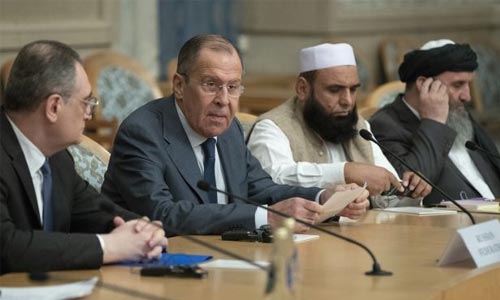The recent Moscow meeting and peace talks between US and Taliban sides with the presence of 11 countries’ representatives, including China, Iran and Pakistan, to settle the conflict in Afghanistan have triggered a sense of optimism among some political figures, especially with the release of Mullah Abdul Ghani Bradar, the co-founder of the Taliban movement, from Pakistani jail. But the Taliban insurgents have intensified their attacks across the country.
Baradar’s release is said to be due to the personal request of US special envoy Zalmay Khalilzad. His release and joining of five high-ranking members of the Taliban faction – including the chief of the Taliban regime’s army, a minister, a deputy intelligence chief, and two governors – the Taliban’s political office in Qatar might nudge the nascent dialogue process forward.
As part of the promised cooperation on not providing shelter to Pakistan’s enemies on Afghan soil, Afghanistan’s allies have killed a number of TTP leaders including Mullah Fazlullah and four other senior TTP commanders in drone attacks in Afghanistan. This was followed by the killing of Umar Rehman, another leading TTP commander. In return, Kabul government expects Islamabad to engage more actively in peace talks and push the Taliban not only to peace table but also to reach an agreement with their interlocutors.
Imran Khan’s leadership has pledged support to the peace talks as Pakistan’s Foreign Minister Shah Mehmood Qureshi said, during his visit to Washington, that Islamabad would back the US move to engage the Taliban. Mullah Bradar’s release reveals Pakistan’s good intention and will increase the bonhomie between Pakistan on the one side and Afghanistan and US on the other side.
Nonetheless, the assassination of Maulana Samiul Haq, who is known as “father of the Taliban”, seems to be planned to blow the whistle on the Taliban’s negotiators. Perhaps, those who plotted the assassination believed that Bradar’s death would be similar to that of Taliban’s leader Mullah Muhammad Omar, the news of which stalled the peace talks between Kabul and the Taliban in Murree, Islamabad. But it failed to interrupt the peace talks despite being celebrated happily by Afghan people. His followers, however, warned of the intensification of their attacks against Afghanistan in the wake of Afghans’ celebration and reiterated “jihad” as legitimate action in the country, which has been strongly condemned and delegitimized by Afghan Ulema Council and high-ranking religious clerics.
The peace negotiators should take it into consideration that a mysterious group is seeking to blow the whistle to sabotage the peace process. In the past, the talks were stalled for one reason or another. For example, a number of high-profile Taliban officials who declared to hold talks with Kabul government were assassinated. The appointment of more radical leaders such as Mullah Mansour and his successor Mullah Haibatullah were likely to be the next reason for blocking the way for talks. Political players must have been behind the designation of those two.
Those high-ranking Taliban individuals who were pushed by external power to the table rather than being sent by the Taliban’s leadership are unlikely to carry much weight in peace deal. Although the Taliban respect them, they no more wield their past authority. In short, their presence is valued but will not be as effective as it is expected.
I have frequently talked of the involvement of regional stakeholders in Afghanistan’s peace issue and deem their presence around a single table more effective and productive. It should go without saying that centralized and organized efforts for peace talks will bear the desired result. But what is a matter of question for me is that whenever the US increases its struggle for talks, Russia also shows more tendency in bringing Afghan and Taliban representatives to the table in Moscow. It seems like a political rivalry rather than real concern for stability. What if the results of the two meetings conflict with each other?
All in all, since the Taliban do not decrease or stop their attacks against Afghanistan, it will be naïve to believe the Taliban’s genuine intention for talks. Two issues have to be considered in the negotiations: First, the peace negotiators have to talk about the end of insurgency before the withdrawal of foreign troops. Accepting Taliban’s peace package without any preconditions or any positive steps by them will be counterproductive. Second, if negotiators are not able to continue the Afghan-led and Afghan-owned peace process, they, at least, should join their forces through forming a single group of all regional stakeholders to continue the talks.
Home » Opinion » Afghan Peace Talks – A Political Jigsaw Puzzle
Afghan Peace Talks – A Political Jigsaw Puzzle
| Hujjatullah Zia

